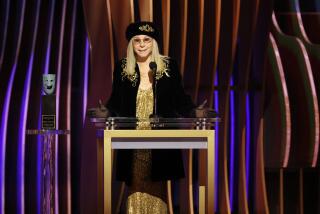‘Mad Men’ rages into award season
The numbers may be small, but they are fervent. The AMC series “Mad Men” does not have a huge fan base -- its audience topped out at 2 million for the second-season premiere -- but that apparently includes every critic in the world. Not to mention fellow actors, writers, directors and producers.
In its first season, the show won Golden Globes for best television drama and lead actor Jon Hamm. Hamm also garnered a SAG nomination for lead actor, and the cast was nominated for drama series ensemble. In September, “Mad Men” won six out of its 16 Emmy nominations, including the big kahuna: outstanding drama series, a first for a basic cable show. It even landed a Peabody Award.
Now, after its second season in 2008, the Golden Globes repeated their earlier two nominations -- drama series and lead actor -- and have added a nod to January Jones for lead actress. The SAG Awards have experienced a similar déjà vu, but instead added Elisabeth Moss for lead actress to their ensemble and lead actor nominations.
So what is it about this show that has the critics so enchanted?
From the retro opening credits, the audience is immersed in the world of Sterling Cooper, an advertising agency in early 1960s Manhattan, populated with men in suits and hats and women in girdles and inferior workplace positions. Hamm plays Don Draper, a brilliant adman with an identity crisis of monumental proportions. Jones is Betty, his beautiful wife, riddled with inchoate rage at her golden life in the suburbs. Moss plays Peggy, a secretary recently promoted to copywriter, an anomaly among the male staff.
The series is as great-looking as its stars, and collected Emmys last year for art direction, cinematography and hairstyling. Viewers feast on period detail as they cringe at the sight of sexist, racist -- even litterbugging -- behaviors. Homosexuality hides in plain sight, while minorities are present but invisible. There’s an initial sense of superiority in the watching -- “just look how far we’ve come” -- but it soon mingles with an uneasy realization that society’s journey in the last 45 years may be more twisted than linear. After all, “You’ve Come a Long Way, Baby” was an ad campaign to lure women to smoking.
That combination of distance and recognition is one of the first clues to its appeal, according to creator and executive producer Matt Weiner. Many viewers catch a glimpse of their own past through the smoke-filled haze. “You’re getting to look at your childhood with an adult eye, and all the detail is right, so there’s a lot of pleasure in that, I think,” offers Weiner, last year’s Emmy winner for outstanding writing for a drama series (in addition to previous wins for his work on “The Sopranos”). “You also get to see that the people of that generation, or our parents’ or our grandparents’, have a lot of the same issues” as people today.
Granted, the characters’ concerns may be more extreme than most grandparents’, with their rampant cheating, false identities, secret births and other office intrigues. But, as in life, the plot never unfolds predictably. In a television schedule loaded with procedurals, that element of surprise can be welcome, if slightly unnerving.
A Season 2 episode, “The Jet Set,” had Don flying west for work only to ditch his meetings and head to Palm Springs with some rich bohemians. He didn’t go home at the end of the hour, and it was entirely possible that he never would. “I’ll read the script and think, I can’t believe that this is where they’re going with the story,” Hamm says. But he’s happy to go for the ride. “I trust Matt to tell a good story and, so far, that trust has been really well founded.”
“People were worried,” Weiner says of the “Jet Set” episode, sounding pleased. “They know this is a show where we might abandon the rest of the characters.”
Moss likewise found herself surprised by her character’s story line. Early on, she wondered whether Peggy would end up marrying Pete after an office affair or perhaps sleeping with Don in an effort to claw her way to the top. Neither path was taken, she points out, “and hence the relationship that she develops with Don is so much stronger and so much more important, and the one with Pete is much more complicated.”
Weiner makes clear that he has nothing against formulaic entertainment, but it’s not something he’s interested in writing. With “Mad Men,” “You have no idea each week what’s going to happen or who the story is going to be about, and I think that’s been a big attraction to people, the mystery of it.”
Fortunately for them, AMC feels the same way. It’s easy to imagine the show clinging to life at a major network, suffering through pages of notes about making Don more likable. In its basic cable berth, it’s a star.
“I consider Matt one of the best authors in television today,” says Charlie Collier, president and general manager of AMC. “When you read what’s on the page, from him and the writers room in general, it is meticulous storytelling,” and that attention to detail extends to every aspect of the show. “At a time where so many people are falling back to reality, to game shows or other perishable items, this feels like something that will truly endure.”
More to Read
The complete guide to home viewing
Get Screen Gab for everything about the TV shows and streaming movies everyone’s talking about.
You may occasionally receive promotional content from the Los Angeles Times.






